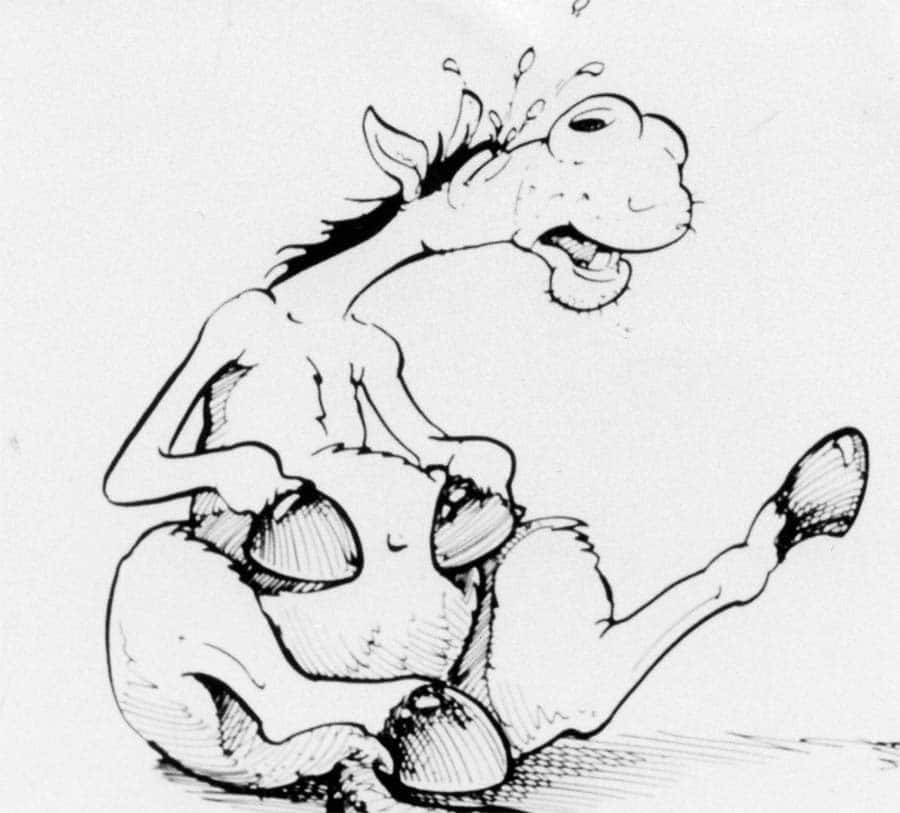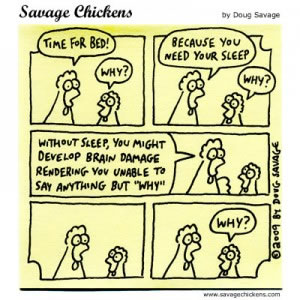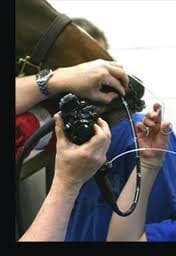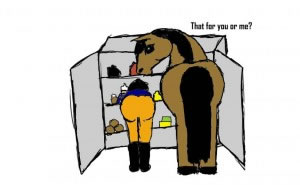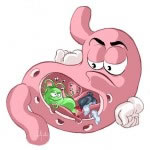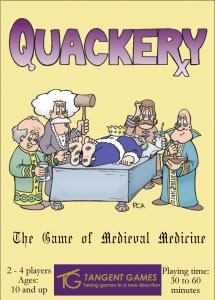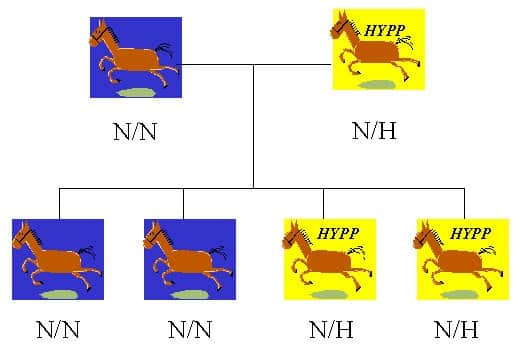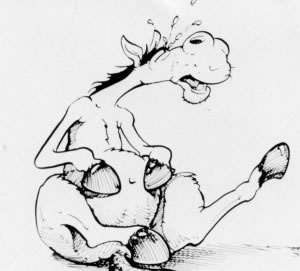 I think that it was somewhere in the late 1980’s that I first heard that horses got stomach ulcers. It was interesting – curious, actually – to find out that horses had ulcer problems with their stomachs. Of course, I had heard of ulcers in people, but I had never really thought about adult horses having stomach problems that resulted in, well, just about anything and everything: colic, loss of appetite, poor performance, anxiety, poor hair coat, and pretty much you name it. It was also curious to me that, prior to all these reports, no one seemed to have recognized a whole bunch of horses with some mystery syndrome. I mean, you’d think if lots and lots of horses had a big problem, at least folks would recognize that there was a problem, even if they didn’t know what it was. But it didn’t happen like that. Nevertheless, all of a sudden, there they were: horses get ulcers.
I think that it was somewhere in the late 1980’s that I first heard that horses got stomach ulcers. It was interesting – curious, actually – to find out that horses had ulcer problems with their stomachs. Of course, I had heard of ulcers in people, but I had never really thought about adult horses having stomach problems that resulted in, well, just about anything and everything: colic, loss of appetite, poor performance, anxiety, poor hair coat, and pretty much you name it. It was also curious to me that, prior to all these reports, no one seemed to have recognized a whole bunch of horses with some mystery syndrome. I mean, you’d think if lots and lots of horses had a big problem, at least folks would recognize that there was a problem, even if they didn’t know what it was. But it didn’t happen like that. Nevertheless, all of a sudden, there they were: horses get ulcers.
NOTE: In this discussion, I’m not talking about ulcers in foals, even though there are some similarities between what happens to foals and what happens to adult horses…
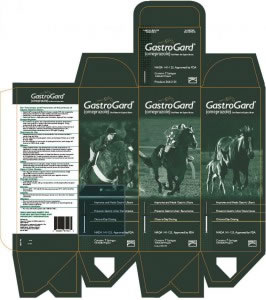 It wasn’t too long after ulcers were noted as a big problem that a medication came out to treat them. Produced by the Merial® company, the product was called GastroGard®. Gastrogard® is a paste form for a drug called omeprazole, which is also available over-the-counter in human drug stores, and sold under the brand name of Prilosec® (which you can take if your horse gives you ulcers). Still, when GastroGard® was introduced, I mostly remember conversations with colleagues along the line of, “Who the heck is going to buy that stuff – it’s SO expensive?” And it’s still expensive. It’s also now available over-the counter as UlcerGard® = and that’s expensive, too.
It wasn’t too long after ulcers were noted as a big problem that a medication came out to treat them. Produced by the Merial® company, the product was called GastroGard®. Gastrogard® is a paste form for a drug called omeprazole, which is also available over-the-counter in human drug stores, and sold under the brand name of Prilosec® (which you can take if your horse gives you ulcers). Still, when GastroGard® was introduced, I mostly remember conversations with colleagues along the line of, “Who the heck is going to buy that stuff – it’s SO expensive?” And it’s still expensive. It’s also now available over-the counter as UlcerGard® = and that’s expensive, too.
After the initial studies, there were a whole bunch of other studies that showed that an alarming number of adult horses – the majority of them, actually – had stomach ulcers, especially race horses and various show horses. To me, it was also alarming that essentially all of the studies were funded by Merial®, but that’s a whole different conversation. But as it turns out, just about everyone was willing to buy ulcer medication, since their horses were so valuable (in price, emotion, etc.). And the treatment worked.
I guess that I could have ended the article right there, but I think that ulcers are worth an article, because I think that lots of horses are probably getting treated for ulcers unnecessarily. It’s also possible that you can treat or prevent ulcers for a whole lot cheaper than what you’re doing now (even if you are buying the drugs yourself, they are still pricey), and saving money is always worth something, isn’t it? And maybe you won’t worry so much. Here goes.
WHY DO ADULT HORSES GET ULCERS ANYWAY?
Tthere are lots of possible reasons. Turns out that most of them are related to how people manage their horses. Here are a few:
- Diet. Diets that have lots of grain in them tend to give horses ulcers. Horses were meant to eat forage – here’s just one more reason that their diet should be made up mostly of forage. (CLICK HERE to read my article, “Hay and Such.”)
- Confinement. Horses are supposed to run around on big grassy plains. Unfortunately, that makes them somewhat hard to catch, so people invented stables and stalls. But stables and stalls also seem to provide some level of stress to horses, which, in turn, seems to help some of them develop ulcers.
- Medication. There are a number of medications that are associated with the development of stomach ulcers, especially non-steroidal anti-inflammatory drugs such as phenylbutazone. Even so, ulcers are rarely a problem unless the drugs are overdosed – AND WHY WOULD YOU WANT TO DO THAT? Phenylbutazone is a very useful, mostly safe drug (CLICK HERE to read my article, “What’s the Beef with Bute?), but there are VERY occasional side effects, and ulcers is one of those.
- Some people think that the fact that race horses run on empty stomachs may make them prone to ulcers. The thought is that when the stomach is empty, stomach acid sloshes around the stomach and burns the stomach lining. Why the empty stomach? Empty stomach = lighter horse = less weight to carry = faster (maybe).
DO ALL ADULT HORSES HAVE ULCERS?
No. Absolutely NOT. Honestly, it’s kind of hard to say what percentage of adult horses get ulcers. If you believe all the studies, you’d believe that it was nearly ALL of them. However, the incidence of ulcers may not be as high as reported. The reports may just reflect some local conditions in the horses that were studied. Plus, no one has ever looked at the horse’s stomach over a period of time to see what happens – it could be that small ulcers just go away on their own. Nobody knows. Here’s what I think: if your horse seems normal, he probably is, and if he’s doing well, then you’re taking good care of him, and it’s unlikely that ulcers are causing any problem(s).
HOW DO I KNOW IF MY HORSE HAS ULCERS?
That’s easy. You look (well, your veterinarian looks). You look with a 3 meter long endoscope, that gets put down into your horse’s stomach.
What you can’t know is if your horse has ulcers based on some vague clinical sign. If he’s not jumping as high, or running as fast, or whinnying as loud, I suppose it could be ulcers, but he might be just having a bad week, too. It’s probably worth a check if you’re concerned about some vague problem.
 Oh – and a couple of people have asked me about this, ulcers can’t be diagnosed by touching acupuncture points.
Oh – and a couple of people have asked me about this, ulcers can’t be diagnosed by touching acupuncture points.
ASIDE: Huh?
Yes, there are people asserting that you can diagnose ulcers in horses by touching acupuncture points (they used to assert that you could do that with equine protozoal myelitis (EPM) as well). Never mind that acupuncture points have never been shown to exist. Just no.
 IT’S EXPENSIVE TO GET A HORSE SCOPED FOR ULCERS. WHY NOT JUST GIVE HIM SOME MEDICINE AND SEE WHAT HAPPENS?
IT’S EXPENSIVE TO GET A HORSE SCOPED FOR ULCERS. WHY NOT JUST GIVE HIM SOME MEDICINE AND SEE WHAT HAPPENS?
On the one hand, I understand this logic. By the time that you put your horse in a trailer, take him to get scoped, wait, head home, you’ve spent some money, and a good part of your day. The medication is certainly harmless enough – maybe if you just buy a few tubes of medicine, you can save time and money, and get the problem solved, too, right?
But before you do that, think about this. Your horse may not have ulcers. Say he’s acting cranky under saddle. You put him on ulcer medication. He gets better. What do you do then? Do you keep him on the medication? There are lots of horses that get treated with ulcer medication using just the same logic – and they’re probably getting treated needlessly. (And if you’re interested, CLICK HERE to see my article on “Wny Therapies May Seem to Work, Even When They Don’t.)
WHAT’S THE BEST TREATMENT FOR ULCERS?
Well, from a drug standpoint, the best treatment probably is Gastrogard®. Now by best, I mean that 1) You only have to give it once a day, 2) It’s in a convenient (paste) form, and 3) It has been shown to work. That said, there are lots of other things that you should consider.
- Ranitidine. Ranitidine is another human anti-ulcer medication. It’s sold under the trade name Zantac.® It’s also effective as an anti-ulcer medication, and it’s LOTS cheaper than GastroGard®. But it’s definitely more time and labor intensive – not as convenient – since most authorities recommend that it be given three times a day (ask your veterinarian about proper dosing).
- Dietary management. You can do a lot to help prevent or treat ulcers with diet. In particular, diets that have some alfalfa hay in them seem to be protective. Horses that graze in pastures, or are fed several times a day seem to have fewer ulcer problems, probably because the food in the horse’s stomach offers some protection against the stomach acid.
- If you want to use GastroGard®, you probably don’t have to use the whole tube. There’s no question that full tube treatment is effective BUT a half tube seems to work just as well, and maybe even quarter tube is just as good. Maybe less. If you look at the literature, doses are all over the board. Veterinary medicine needs to study this more.
In human ulcers, there’s a bacteria, Helicobacter pylori, that can complicate matters.* It hasn’t get been proven to be a problem in horses, but there are apparently some horses that just don’t seem to respond to regular old therapy. In those horses antibiotics might be worth a try. Talk to your veterinarian if you’ve got a horse with ulcers that isn’t responding to treatment.
WHAT ABOUT VARIOUS OMEPRAZOLE POWDERS, OR THE HUMAN STUFF?
Theoretically, omeprazole has to be protected from stomach acid. Omeprazole doesn’t work like a bandage on top of the ulcer, rather, it’s absorbed into the small intestine, and works systemically by inhibiting stomach acid secretion. Human omeprazole tablets have a protective coating – no horse product does. There was one study showing that omeprazole powders don’t work consistently, and, given the problems with compounded medications, I think that if you’re going to use omeprazole, I wouldn’t advise using a cheaper omeprazole at this time (there are many available).
Yeah, well, no. Ulcer supplements – like most supplements – don’t seem to have much behind them. Treating the darn things is expensive enough, and you can make some very sensible and very useful adjustments that won’t cost you anything. Save your money.
WHAT ABOUT “ALTERNATIVE” TREATMENTS?
Um, also no. There is some pretty loopy stuff being proposed for ulcer treatment and prevention (chiropractic, acupuncture, homeopathy, and the like). Don’t bother.
Honestly, I find all of the ulcer stuff really curious. I mean, I don’t have any doubt stomach ulcers are a real condition; I’m just wonder about how big a problem it is. I still rarely see horses that I think might have ulcers, or ulcer-related problems, and I see plenty of horses in conditions where ulcers should be a problem. I just don’t think that the book is closed.
The bottom line, however, is that stomach ulcers are a condition that is easy to identify, fairly easy to treat, and one that you can even do something about with a few simple changes that may mean your horse doesn’t need any medication at all.
Not so bad, really.
********************************************************************************************
* The association of H. pylori with human gastric ulcers is one of the more interesting stories in medicine, at least in my opinion. Two doctors, Barry Marshall and Robin Warren figured it out. They had to endure a lot of grief from the scientific community about it, but they ultimately were awarded the Nobel Prize in Medicine in 2005. Actually, the story is a great example of how ideas that were initially scoffed at were proven to be true, and became generally accepted. In fact, that’s the way that things SHOULD work.

